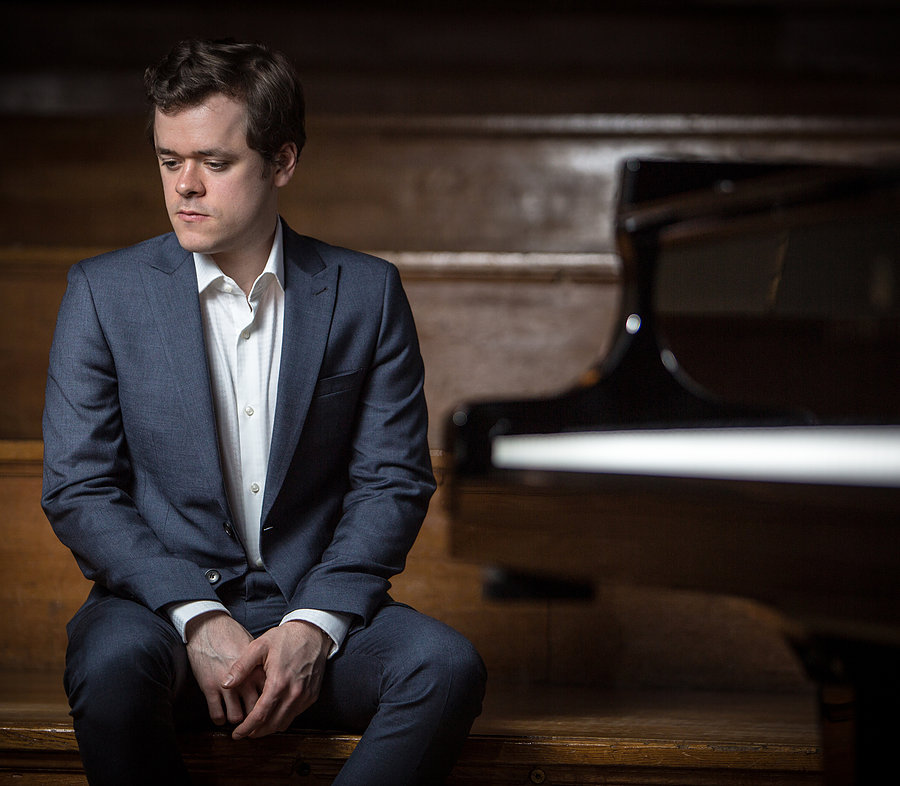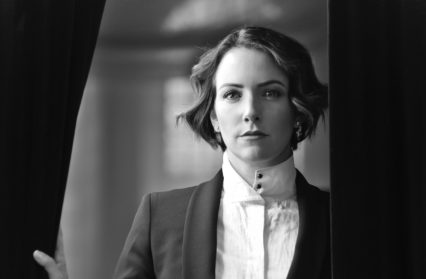Nigel Jarrett reviews the concert of the London Philharmonic Orchestra at St David’s Hall in Cardiff, on the 16th of October 2018, conducted by Alondra de la Parra.
London Philharmonic Orchestra
Soloist: Benjamin Grosvenor
Conductor: Alondra de la Parra
Glinka: Overture, Ruslan and Ludmilla
Chopin: Piano Concerto No. 2 in F minor
Tchaikovsky: Symphony No. 5 in E minor
St David’s Hall, Cardiff, 16 October 2018
Listening to Benjamin Grosvenor in Chopin’s Piano Concert No. 2 at this opening concert of a short UK tour he’s undertaking with the LPO and Mexican conductor Alondra de la Parra illustrated unintended consequences. His insouciance and sureness of touch, even with the orchestra in close attendance, highlighted even further how Chopin allows the soloist to dominate proceedings, despite that lengthy wait at the start. It’s a composer in thrall to the keyboard, with the orchestra offering encouragement and almost tentative commentary.
It’s as if the piano is shouldering unaided, or with little need of help, the burden of Romantic utterance, as historically it more or less was. One wouldn’t wish to be as harsh as Berlioz, who thought the orchestra were ‘interfering’ with the piano part, but there is a glaring disconnect. The story goes that Chopin the pianist rarely played extra-loud, tempting though it must have been. Intimacy is his music’s forte, as it were.
Grosvenor’s playing was of a piece, his ornamentations rarely over-stated and his sense of forward movement never emphasised simply to indicate that he could go it alone without the band egging him on. The way he took delivery of the themes stated by the orchestra in the first movement was typical of the position he assumed throughout of grateful but independent practitioner. There were moments in the central slow movement when he appeared to be carried away by the florid piano writing, especially where the embellishments are speedier; but allowing the music its improvisatory character justified the approach.

Keeping time in such dense and variable figuration when it seems to be suspended was not the least of his accomplishments. By the final movement it was almost as if the orchestra had been inspired by such sparkling pianism to rouse itself. Alondra de la Parra, making her first visit to St David’s Hall, lost no time in encouraging it to match the new vitality of mood, for which the soloist seemed more than grateful, relishing its further equivocations of meter.
How different Tchaikovsky’s Fifth Symphony sounds with a conductor in charge who never allows it to dwell in the despond it keeps creating for itself. As concerned to shape its melodies with almost sensual grace as she was to accentuate both the brooding and the explosive Fate episodes, de la Parra had this wonderful orchestra happily doing her bidding. There’s a story to be told in the Fifth and it’s essentially a love story that de la Parra muted in the first movement (where there are hints of it), allowing the opening horn solo of the second to herald its flowering in the oboe, the clarinet and bassoon, and then the strings. The rolling complexity of this movement and the shading necessary to give the themes variety of expression were there in the subtle changes of speed and temperament, and in the way it seemed to merge into the third movement’s waltz.
The all-pervasive hand of Fate, no longer stayed, erupts in the final movement, which de la Parra took at a lick. Not often does one hear this symphony performed with a sense of dynamism that did not, however, preclude its core passion. At the end, de la Parra waded into the orchestra ranks to acknowledge all those who had made it special and who must have known that its energetic construct was down to her. The concert had opened with a rousing performance of Glinka’s overture to his opera Ruslan and Ludmilla, making one wonder yet again whether the drama it prefaces might be worth more houses taking it on. Probably not, though the Russians like it.
Alondra de la Parra conducted the LPO on tour in Mexico two years ago. Last year she became music director of the Queensland Symphony Orchestra, the first woman to take charge of an Australian band. She’s associated with the Camerata Salzburg, with whom next January she will première T.H.A.M.O.S, a version of Mozart’s Thamos, King of Egypt by Carlus Padrissa, for the Salzburg Mozarteum Foundation.
This Cardiff event hosting the London Philharmonic Orchestra was part of the St David’s Hall International Concert Series. Before it on the hall’s Level 3, a song recital was given by two students of the Royal Welsh College of Music and Drama, soprano Hannah Savignon-Smythe and pianist Jeslyn Asir. In music by Mozart, Verdi, Wolf and Bernstein, they valiantly negotiated the tinkling distractions of an audience waiting to enter the main auditorium. It’s not an ideal setting for musicians hoping to turn professional and expecting to play for listeners giving their undivided attention. But at the end of Glitter And Be Gay, from Bernstein’s Candide, Ms Savignon-Smythe and her pianist literally rose above the throng to overcome their roving nemesis with aplomb. Good for them.
Header photo of Alondra de la Parra by Oscar Turco
You might also like…
Cath Barton reviews the WNO production of La Cenerentola by Charles Perrault, a variation on the classic Cinderella fairy tale.
Nigel Jarrett is a writer and critic and a former daily-newspaper journalist. He won the Rhys Davies Prize for short fiction and the Templar Shorts Prize. He has published a novel; a poetry collection; and two volumes of stories, the first, Funderland, being praised by the Guardian, the Independent, the Times and several more. He was formerly music critic of the South Wales Argus and now writes for Wales Arts Review, among others. Templar Press is soon to publish his pamphlet of stories, A Gloucester Trilogy. He lives in Monmouthshire, and swims a lot.



 Enjoyed this article? Support our writers directly by buying them a coffee and clicking this link.
Enjoyed this article? Support our writers directly by buying them a coffee and clicking this link.







